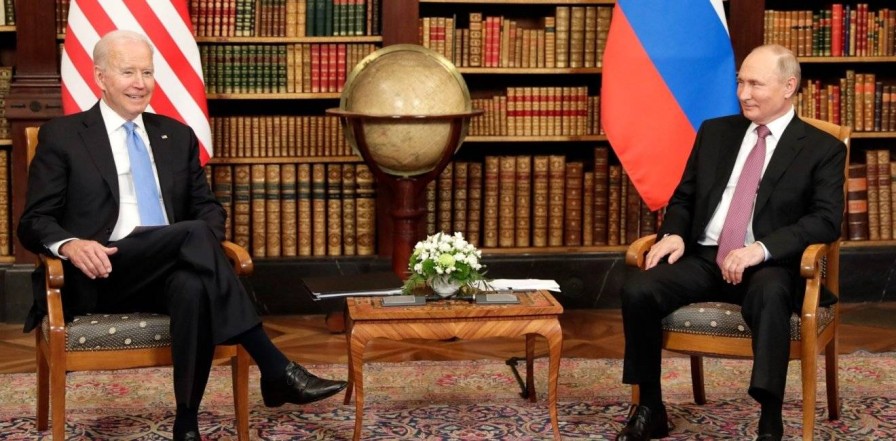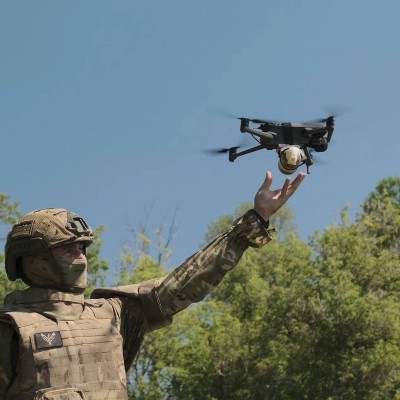Freedom force: Foreign fighters in Ukraine
Legionnaires tell their stories from the frontline and the reception they got at home.
The Mad and the Brave: The untold story of Ukraine’s foreign legion, by Colin Freeman.
Legionnaires tell their stories from the frontline and the reception they got at home.
The Mad and the Brave: The untold story of Ukraine’s foreign legion, by Colin Freeman.
It’s taken six months for United States President Donald Trump to decide his Russian equivalent is not on the side of history.
Trump has much to thank Vladimir Putin for, including the 2016 election. Russia’s army of disinformation hackers played a key role, as the history of the CIA reviewed last week made clear. It also revealed American presidents too often ignored accurate intelligence when it came to Soviet or Russian intentions.
During World War II, President Franklin Roosevelt sided with Josef Stalin against Winston Churchill at their summits, according to Tim Bouverie’s new diplomatic history, Allies at War. Roosevelt’s softness on Bolshevism, however, was reversed by his successor, Harry Truman.
After the collapse of the Soviet Union and the end of the Cold War, American policies again misjudged Russia, leading to Putin’s rebuilding of an empire opposed to Western concepts of peace and democracy.

Presidents Joe Biden and Vladimir Putin at their summit meeting in Geneva, 2021.
The CIA correctly warned of Russia’s invasion of Ukraine in February 2022, but this was brushed aside by policymakers in Europe and Ukraine itself. President Joe Biden was not blind to Putin’s intentions but failed to deliver the decisive response that might have forced a Russian backdown.
More than three years later, Trump has finally given Putin a 50-day window to do that. Whether the promised secondary tariffs against Russia’s main oil clients, India and China, achieve that goal remains to be seen.
More likely to succeed is Trump’s realisation that trying to force a Ukrainian surrender is not possible. This was Roosevelt’s line as well, but he was finally persuaded by Churchill that Britain was not going to give up against Germany.
Biden’s prevarication toward defeating Russia, and Trump’s six months of bluster on whether to give Ukraine sufficient means to defend itself, gave Putin time to build up his war machine. But the collapse of Russia’s allies in the Middle East and Trump’s backing of Israel’s attack on Iran have given Ukraine and its supporters hope that the opportunity for a ceasefire has come.

Drones changed the nature of warfare in Ukraine.
In recent weeks, Russia has stepped up its drone and missile bombardments to the highest level since the start of the invasion three years ago. This was partly due to Trump’s decisions, since overturned, to stop American intelligence and aid, especially Patriot and other air-defence missiles.
Such tactics gave Russia a free hand and rewarded aggression – the usual response of dictators to appeasers. The full details of new weapons for Ukraine are not known, but holding back to provide the element of surprise that hit Iran wouldn’t go amiss.
Reports from the battlefield indicate the type of warfare has evolved in ways that confound conventional attitudes. Both sides have become heavily dependent on cheap and effective drones, access to technology such as Starlink, and – in Ukraine’s case – a motivated population that knows it must innovate and apply ingenuity to win against the odds.
The cause of freedom, and its appeal throughout the Western world, should not be underestimated. Ukraine has drawn support from all kinds of foreigners, including New Zealanders. There’s also a significant difference from Western involvement in other wars such as Vietnam, Afghanistan, and the Middle East.
The Ukrainians welcome anyone prepared to help, whether it’s for humanitarian purposes or putting lives on the line. The closest parallel is the Spanish Civil War, when the Republican cause drew recruits from socialists and anti-Fascists in dozens of countries.
George Orwell’s classic of his Spanish experience, Homage to Catalonia, is the inspiration for Colin Freeman’s The Mad and the Brave, the story of a dozen or so foreigners who signed up for the Ukraine International Legion.
Freeman has reported from Ukraine as chief foreign correspondent of London’s Sunday Telegraph. His first book, Between the Devil and the Deep Blue Sea, was about a private hostage rescue mission in Somalia. For his latest, he interviewed mainly British volunteers about their experiences over the past three years, both at the front and back at home.

Foreign correspondent Colin Freeman.
President Volodymyr Zelensky declared the Legion three days after the invasion, and Putin’s hoped-for easy victory failed to materialise. The first few weeks brought 20,000 responses, mainly from professionally trained soldiers who found Civvy Street didn’t meet their needs after retirement from active service.
Many were battle-hardened from serving in Iraq or Afghanistan. Like the Spain experience, Western countries officially stood back from supporting the Legion. Most actively opposed their citizens from joining by withdrawing the privileges they had as war veterans.
It was no easier after the volunteers had been recruited and arrived in Ukraine. Freeman quotes from an 80-page report prepared several months into the war that dealt with the many problems. For a start, the Legion was never an official organisation.
Deficiencies included the absence of paperwork, equipment, and training facilities. Payment and conditions were uncertain. While Zelensky promised a well-structured institution, the “reality has proven quite different. Many of our brothers-in-arms feel that the Ukrainian army has let them down and sold them a pipe dream,” the report said.
Despite this, Freeman finds most volunteers were prepared to put up with shortcomings in return for seeing some action. Eventually, most got what they asked for. The dozen or so who told their stories to Freeman ensure the bulk of the book is combat-focused.
The frontline action is well described, particularly during the first few months when the Russians were forced back from Kyiv but took key cities such as Mariupol and Kharkiv. Some of the grimmest reading is the Russian capture of Mariupol on the coast of the Sea of Azov.

Mariupol after its capture by Russia in March 2022. It has since been partly rebuilt.
A 60-year-old British veteran of fighting for the Kurds in Iraq was among the Azov brigade that surrendered after defending the giant steelworks. He became a prisoner of war and was one of three men in the book who survived torture in captivity and were released in a swap partly organised by Russian oligarch Roman Abramovich.
This bizarre event involved being flown in Abramovich’s luxurious private jet to Riyadh, where the released prisoners were five-star hotel guests of Crown Prince Mohammad bin Salman. Others weren’t so lucky. A British ex-paratrooper, who had also been with the Kurds in Iraq, ran a rescue and recovery operation that removed the dead and injured from the battlefield.
His body was found a month after he went missing near Zaporizhzhia, the victim of a financial dispute with one of his partners rather than Russian artillery. The alleged killer, a veteran of fighting against Isis in Syria, disappeared and hasn’t been seen since.
A week earlier, a former Scots Guard was found drowned in a lake near Kramatorsk in eastern Ukraine. His arms had been bound behind him and his death remains unexplained. Again, Russian involvement was ruled out.
Such deaths are tragic for their families back home in Britain, as officially the casualties were not seen as Orwell-style heroes, or even ordinary soldiers, but as mercenaries and thrill-seekers doing it for money or kicks.
The payment, as mentioned, wasn’t the kind you can get as bodyguarding or security work. But the Legionnaires were rewarded by their reception as friendly foreigners. They could mix and socialise with locals rather than be seen as occupiers. Two of Freeman’s subjects married Ukrainian women and accepted offers to buy cheap permanent homes there rather than return to a place where they could be treated as outcasts.
Such stories give plenty of impetus to a racily written account. Freeman lightly sketches in the necessary information about political events up until March this year, as well as the changing nature of weaponry used.
While this cannot provide a pointer to whether Trump’s about-turn will bring the conflict to an end, it does explain why Ukraine has attracted those prepared to risk their lives for a foreign country in support of universal values.
The Mad and the Brave: The untold story of Ukraine’s foreign legion, by Colin Freeman (Mudlark/HarperCollins).
Nevil Gibson is a former editor at large for NBR. He has contributed film and book reviews to various publications.
This is supplied content and not paid for by NBR.
Sign up to get the latest stories and insights delivered to your inbox – free, every day.